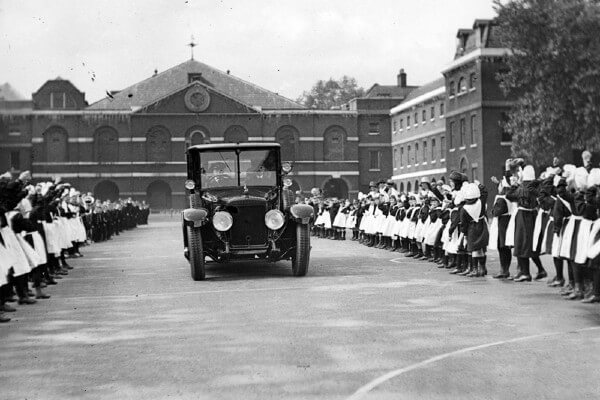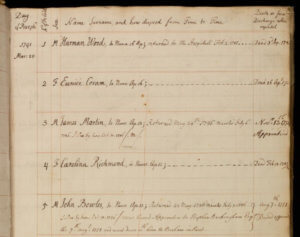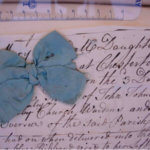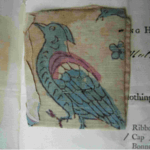Coram Launches Digitisation of Foundling Hospital Archive

The UK’s oldest children’s charity, Coram, today embarks on the first major phase of its ambitious new Voices Through Time: The Story of Care programme, with the help of volunteer transcribers, to digitise its archive dating back to when it was established as the Foundling Hospital in 1739.
Funded by the National Lottery Heritage Fund, the programme will see the digitisation of 25% of the archive, around 112,000 pages of the most fragile records, bringing to life the personal stories of the children who grew up in the Foundling Hospital, the UK’s first dedicated home for children whose parents were unable to care for them. The content will be made accessible online for the first time at coramstory.org.uk, alongside an interactive Timeline of Care, illuminating the history of the birthplace of social care, with the legal, social and cultural milestones in the story.
Coram is calling for volunteers to help with transcribing the documents online, starting with the General Registers, which record the details of children admitted to the Foundling Hospital from 1741. Other materials that will be digitised during the four-year project include the petition letters from mothers appealing for their children to be able to live in the Hospital, and books containing fabric tokens left as a symbol of the connection of children and their mothers.
Details of three stories held in the archive include:
 John Bowles was one of the first children admitted to the Hospital, aged one month old, in 1741. Nothing was known about his mother, but he was carefully wrapped in a piece of cloth, marked with the letters I and A, and a brown cloak. It is thought he went to work in a grand house where the young Mozart had lived
John Bowles was one of the first children admitted to the Hospital, aged one month old, in 1741. Nothing was known about his mother, but he was carefully wrapped in a piece of cloth, marked with the letters I and A, and a brown cloak. It is thought he went to work in a grand house where the young Mozart had lived- Mary Oxford was recorded as having ‘a blemish in the eye’ on her admission to the Foundling Hospital in 1752. She was recorded as ‘undisposed of’, marking her sight impairment as a barrier to future employment outside the Hospital. Mary’s tenacious character saw her forge a successful career but also brought her into conflict with authorities
- John Brownlow was admitted to the Foundling Hospital in 1800 at the petition of his mother, Mary Goodacre. He came to develop a close association with the writer Charles Dickens and wrote several books, and went on to become the Secretary of the organisation in a story which also highlights the social stigma of his early beginnings
Coram’s Foundling Hospital archive, which is housed at the London Metropolitan Archives (LMA), extends over 245 linear metres of records and contains these intriguing stories and 25,000 more, tracing children’s lives throughout their time at the Foundling Hospital and beyond.
As the government embarks on an independent review of children’s social care, it is more important than ever to examine and learn from the narrative of our collective history, charting the key moments in the evolution of children’s rights, policy and practice and to hear directly from children and young people today about their views and aspirations for the future of care.
When transcription of the materials is complete, they will be brought to life both for new audiences to view online at coramstory.org.uk and safeguarded for future generations.
The website will also feature content from care-experienced young people today, who are taking part in a series of creative projects engaging with the archive to understand and share their own stories of care.
Dr Carol Homden, CEO of Coram, said: ‘Coram’s archive represents an unbroken institutional narrative from our establishment as The Foundling Hospital in 1739 to the present day as a group of specialist organisations at the heart of the children’s sector. It tells us about the daily lives of children and their mothers and the agonising choices they faced in what was a very different time but also the enduring issues and challenges of care which continue today.
‘It is our duty to ensure its long-term preservation of this precious archive for future generations and to work with young people in care today to explore their heritage and stories and tackle the issues they continue to face, feeling overlooked and misunderstood by the wider public. This is why the young people’s voice is at the heart of this work, enabling them to engage with the past, explore the present and influence the future of care.’
Volunteer opportunities for the programme take place online using global volunteering platform Zooniverse and involve transcribing portions of text in the historical documents. Volunteering is open to everyone with access to the internet – no specialist background, training or expertise is required.
To find out more about the programme, archive stories and volunteering opportunities, please visit coramstory.org.uk.



